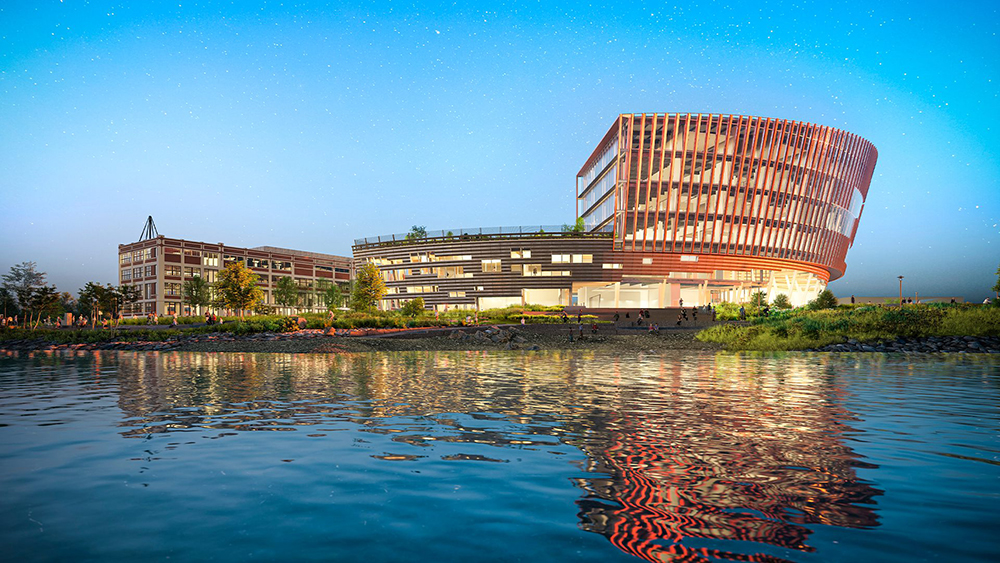
CambridgeSeven breaks ground on Roux Institute at Northeastern University’s Portland, ME campus

Portland, ME CambridgeSeven celebrated the start of construction for the Roux Institute at Northeastern University’s new permanent campus, following a groundbreaking ceremony on September 13. As the lead architect for the campus, located on the former B&M Baked Beans factory site, the design team has worked in close partnership with founders David and Barbara Roux, academic partner Northeastern University, and a skilled team of consultants to bring the bold vision of the new academic building and the revitalized waterfront site into reality. The $500 million project is expected to be completed in late 2027.
“CambridgeSeven is thrilled to be leading the team designing and building the Roux Institute at Northeastern University in Portland, ME,” said Timothy Mansfield, AIA, CambridgeSeven’s principal-in-charge. “Together we are bringing our bold, trailblazing design to fruition, reflecting not only Maine’s rich architectural heritage, but also manifesting the Roux’s vision of an innovation economy that will expand and thrive in Portland, Maine for generations to come.”
Central to the new campus is the striking 245,000 s/f flagship Alfond Center dedicated to learning, research and collaboration. The Center is specifically designed for innovative educational programs in digital engineering, computer and data sciences, artificial intelligence, advanced life sciences, and medicine. The first program of its kind in the Northeast, the Roux Institute at Northeastern University will conduct research, assist start-up entities, and partner with private, public and non-profit organizations to develop 21st century workforce talent as well as offer post-graduate degree programs and certifications. The building will house computational academic spaces, life science labs and advanced active-learning classrooms organized around a soaring gathering space known as “The Portal.”
The building’s contemporary design offers a juxtaposition of an architectural expression that embodies the forward-looking, innovative vision of the Institute while at the same time, embraces the industrial landscape of the city, and its authentic materials: granite, brick, copper, wood, and glass. Specifically inspired by the Bailey Island Bridge, a remarkable engineering accomplishment designed with interlocking Yarmouth granite cribbing, the new Alfond Center reflects key characteristics of the bridge, with a sweeping, powerful curvilinear form, both horizontally and vertically. The design’s unique form gracefully extends around the peninsula and rises dramatically at the center to reveal The Portal, which bridges the central circulation and gathering space with sweeping views and access to the water’s edge. The lower volume will comprise an artful mix of granite and glass while the upper volume will transition to a more articulated façade of copper metal panels and glass that reflect Portland’s heritage of industrial architecture.
The building’s sustainable and resilient architectural design supports the vision of the Rouxs and Northeastern University, whose goal was to create an innovative research hub that would educate generations of local talent for the digital, artificial intelligence and life sciences sectors, while stimulating Maine’s economy and enriching the community. The building will feature a climate-adaptive façade that is fully electric, incorporating geothermal wells and including a three-story mass timber section, as well as a rooftop garden with expansive views to Casco Bay.
In addition, the 58,000 s/f “Bean” building will undergo major rehabilitation and support innovation and early-stage entrepreneurship, providing workspaces for startups and businesses. The campus will also allow for growth in residency and accelerator programs focused on the innovation economy and health care.
The project also includes a new parking garage, an adjacent childcare center and for the first time in more than a century, there will be public green spaces, pedestrian and bicycle paths and a publicly accessible pier on the shores of Casco Bay open to visitors and residents.